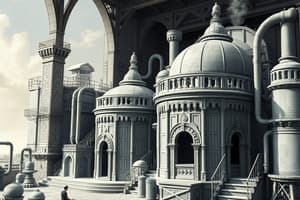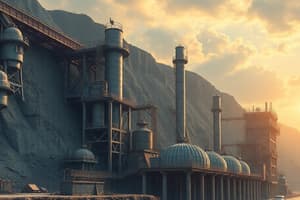Podcast
Questions and Answers
What does OPC stand for?
What does OPC stand for?
Ordinary Portland Cement
Which of these is an example of a cement accelerator?
Which of these is an example of a cement accelerator?
- Calcium Chloride (correct)
- Water
- Fly Ash
- Gypsum
What is an example of a retarder?
What is an example of a retarder?
Gypsum
Air-entraining admixtures improve freeze-thaw resistance by creating tiny air bubbles.
Air-entraining admixtures improve freeze-thaw resistance by creating tiny air bubbles.
Plasticizers reduce the amount of water needed in a cement mix, making it more workable.
Plasticizers reduce the amount of water needed in a cement mix, making it more workable.
Superplasticizers are a type of water reducer that allows for a smoother and more workable concrete mix.
Superplasticizers are a type of water reducer that allows for a smoother and more workable concrete mix.
Which of the following is NOT a recommended practice for cement storage?
Which of the following is NOT a recommended practice for cement storage?
Cement should be used on a first-in, first-out (FIFO) basis.
Cement should be used on a first-in, first-out (FIFO) basis.
It's a good idea to overstock cement to avoid running out.
It's a good idea to overstock cement to avoid running out.
Which of these is NOT a recommended practice for handling cement?
Which of these is NOT a recommended practice for handling cement?
It is important to thoroughly mix cement with aggregates and water to achieve desired concrete strength.
It is important to thoroughly mix cement with aggregates and water to achieve desired concrete strength.
OPC is typically used in general construction like buildings and roads.
OPC is typically used in general construction like buildings and roads.
PPC is preferred for structures exposed to aggressive environments.
PPC is preferred for structures exposed to aggressive environments.
Rapid Hardening Cement is used in situations where high strength is needed quickly, such as road repairs.
Rapid Hardening Cement is used in situations where high strength is needed quickly, such as road repairs.
Flashcards
Ordinary Portland Cement (OPC)
Ordinary Portland Cement (OPC)
A common type of cement used in general construction, known for its strength and heat resistance.
Portland Pozzolana Cement (PPC)
Portland Pozzolana Cement (PPC)
A cement type with pozzolanic materials, offering better durability and sustainability than OPC.
Rapid Hardening Cement
Rapid Hardening Cement
Sets quickly, ideal for fast-paced construction projects.
Low Heat Cement
Low Heat Cement
Signup and view all the flashcards
Sulfate Resisting Cement
Sulfate Resisting Cement
Signup and view all the flashcards
White Cement
White Cement
Signup and view all the flashcards
Colored Cement
Colored Cement
Signup and view all the flashcards
High Alumina Cement
High Alumina Cement
Signup and view all the flashcards
Cement Accelerators
Cement Accelerators
Signup and view all the flashcards
Cement Retarders
Cement Retarders
Signup and view all the flashcards
Air-Entraining Admixtures
Air-Entraining Admixtures
Signup and view all the flashcards
Plasticizers
Plasticizers
Signup and view all the flashcards
Superplasticizers
Superplasticizers
Signup and view all the flashcards
Water Reducing Admixtures
Water Reducing Admixtures
Signup and view all the flashcards
Cement Storage
Cement Storage
Signup and view all the flashcards
FIFO
FIFO
Signup and view all the flashcards
Cement Handling
Cement Handling
Signup and view all the flashcards
Study Notes
Types of Cement
- Ordinary Portland Cement (OPC) is used in general construction, like buildings and roads
- Portland Pozzolana Cement (PPC) is preferred for structures in aggressive environments
- Rapid Hardening Cement is used for situations needing quick strength, such as road repairs
- Low Heat Cement is used for specific construction needs
- Sulfate Resisting Cement is used for specific construction needs
- White Cement is used for specific construction needs
- Colored Cement is used for specific construction needs
- High Alumina Cement is used for specific construction needs
Admixtures in Cement
- Accelerators speed up cement setting time (e.g., Calcium Chloride)
- Retarders slow down cement setting time (e.g., Gypsum)
- Air-Entraining Admixtures improve freeze-thaw resistance by creating tiny air bubbles
- Plasticizers increase workability of the mix without adding more water
- Superplasticizers are high-range water reducers that offer better flow at lower water content
- Water-Reducing Admixtures reduce water content for specific strength
Cement Storage
- Store cement in dry, waterproof conditions
- Place bags on raised platforms to avoid moisture contact
- Ensure proper ventilation in the storage area
- Use a first-in, first-out (FIFO) system for stock rotation
- Avoid storing cement for long periods to prevent strength loss
- Do not overstock
Cement Handling
- Wear protective gear (gloves, masks) when handling cement
- Avoid direct skin contact and inhalation of cement dust
- Use mechanical equipment (cranes, conveyors) for large quantities
- Follow ergonomic practices for manual handling
- Ensure proper mixing of cement with aggregates and water
Best Practices for Cement Management
- Maintain clean and dry storage areas
- Use cement as soon as possible after delivery
- Regularly check for lumps or moisture in stored cement
- Handle cement carefully to avoid waste or contamination
- Incorporate admixtures thoughtfully based on environmental conditions and project needs
Studying That Suits You
Use AI to generate personalized quizzes and flashcards to suit your learning preferences.



